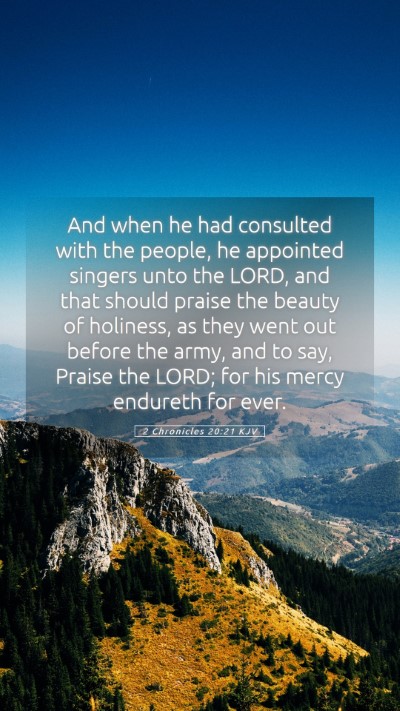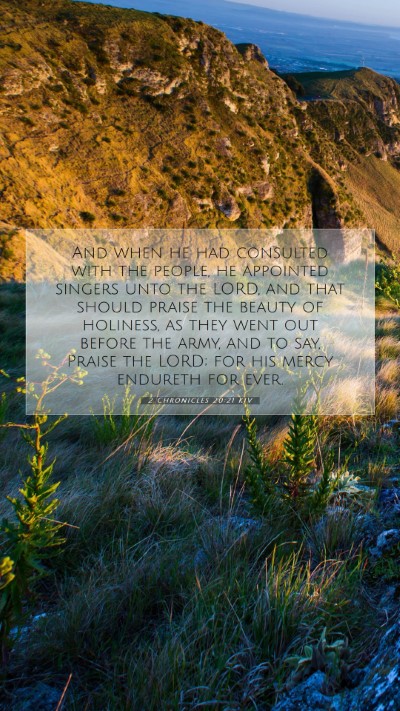Understanding 2 Chronicles 20:21
Verse Context: 2 Chronicles 20:21 states, "And when he had consulted with the people, he appointed singers unto the Lord, and that should praise the beauty of holiness, as they went out before the army, and to say, Praise the Lord; for his mercy endureth forever." This verse comes from a pivotal moment in the life of King Jehoshaphat of Judah, where he seeks God's help against a formidable enemy.
Bible Verse Meanings
- Consultation with the People: Jehoshaphat's consultation shows a leader's humility in acknowledging the need for collective input, indicative of communal decision-making in spiritual matters.
- Role of Worship: The presence of singers emphasizes the power of worship and praise in spiritual warfare. This act demonstrates faith in God's promise and invites His presence into the situation.
- God's Mercy: The phrase "for his mercy endureth forever" reflects a core attribute of God’s nature, underscoring His enduring faithfulness and love toward His people.
Bible Verse Interpretations
Matthew Henry notes that the response to crisis through praise serves as an "act of faith," portraying the singers as emissaries of hope. Albert Barnes emphasizes that this method of praise before battle indicates a reliance on divine intervention. Adam Clarke views this act of worship as foundational for spiritual victories, suggesting it establishes a precedent for how believers engage with God during trials.
Bible Verse Explanations
This verse encapsulates a remarkable theological principle—that worship acts as both preparation and response in times of adversity. By praising God beforehand, Jehoshaphat signals trust in God’s ultimate plan and power. This not only reassures the people but acknowledges God’s sovereignty over the current circumstances.
Bible Verse Commentary
Public domain commentaries agree on the significance of worship in the context of spiritual warfare. Matthew Henry remarks that the act of sending singers before the army is spiritually strategic, shifting the focus from the enemy to God. Albert Barnes mentions that this act of praise acts as a demonstration of faith, a principle that can be applied universally across various challenges in both individual and collective contexts.
Scripture Analysis
This verse can be analyzed through various lenses:
- Historical Context: Recognizing the geopolitical pressures facing Jehoshaphat allows for a deeper understanding of the magnitude of his faith.
- Theological Implications: This account illustrates the importance of worship in connecting with God, suggesting that it serves as both a weapon and a shield against adversity.
- Practical Application: Believers today can apply this model of faith-led worship in their daily struggles, encouraging a proactive spiritual approach rather than a reactive one.
Additional Insights
Understanding 2 Chronicles 20:21 provides valuable insights for Bible study groups and online Bible study forums. This verse can serve as a case study for Bible study resources focusing on themes such as faith in adversity, the power of worship, and collective spirituality.
Cross References
- Psalms 136:1: "O give thanks unto the Lord; for he is good: for his mercy endureth forever."
- 2 Chronicles 20:1-4: The lead-up to verse 21 recounts Jehoshaphat's fear and his seeking of the Lord.
- Exodus 15:1-2: A song of praise after crossing the Red Sea demonstrates the power of worship after deliverance.
- Psalms 33:1: Calls the righteous to rejoice and praise the Lord, aligning with the themes in Jehoshaphat's approach.
Conclusion
In conclusion, 2 Chronicles 20:21 illustrates that worship and praise are essential responses to life’s challenges. The verse serves not only as a narrative of ancient history but as a timeless principle for all who seek God’s intervention in their lives.


